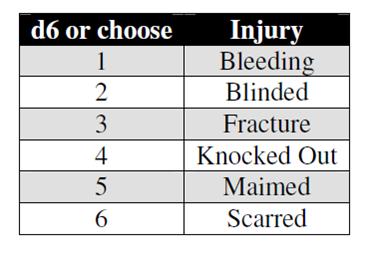Death & Dismemberment
These rules are adapted from the system developed by Arnold Kemp on the goblinpunch blog. You can read Arnold's original rules on the document below. I've adjusted these rules to simplify them and account for the reduced threat of White Box where monsters only deal 1d6 damage for the most part.
| goblin_punch_death_and_dismemberment_v23.pdf |
Hit Points and 0 HP
Hit Points represent your ability to avoid Injuries. When HP reach zero, you risk acquiring Injuries. HP never drop below zero and you do not die simply from having no HP. Injuries are long-lasting problems. Your number of Injuries is always deducted from any healing you receive (from binding wounds, cure spells, potions, etc).
Injury Tests
When damage would take HP below zero, you gain an Injury. You can choose an Injury or roll it on the table below:
You also have to make a Injury Test by rolling 1d6 (Dwarves roll 1d8). If you roll equal to or less than your current number of Injuries (including this one), your Injury is more serious: it is a Grave Injury or a Wound.
The effects of most Injuries last 1d6 days (but the Injury remains until healed through resting); the effects of Grave Injuries are usually permanent.
- BLEEDING: After strenuous activity (running, climbing, hitting successfully in combat, casting a spell) you must save vs Paralysis or faint for a round; you can be tracked by monsters; Grave: permanently lose a Hit Die
- BLINDED: Lose use of (50% either) left or right eye: -2 on all range combat, +2 on saves vs your ranged spells; Grave: loss of eye is permanent
- FRACTURE: Your spells fail 50%; when rolling Initiative, treat 1-3 as 1 and 4-6 as no action; Grave: permanently lose a point from STR, DEX and CON
- KNOCKED OUT: Fall unconscious for 1d6 hours, recover on save vs Death or suffer coma for 1d6 days,, forget all spells; Grave: coma for 1d6 weeks, recover on save vs death or coma is permanent
- MAIMED: Lose use of (d4: 1) right arm, (2) left arm, (3) right leg or (4) left leg: arms drop held item and cannot use two-handed weapons, legs cause fall, cannot rise unassisted and movement cut to 3; save vs Death to avoid loss of finger/toe or gaining a scar; Grave: limb severed or permanently ruined
- SCARRED: Your Charisma drops to 3 and all henchmen must make Loyalty tests; Grave: Permanently lose a point from INT, WIS and CHA
If you receive the same Injury a second time to the same part of the body, you must treat it as a Wound.
Wounds
If you receive a Grave Injury you can choose instead to take a Wound. A Wound still counts as an Injury. The wounded character collapses and starts to die. The character will die after 3 rounds unless they receive successful First Aid. Another character must spend a full round applying First Aid. The wounded character saves vs Death each time they receive First Aid. If the saving throw is successful, the character recovers and then rolls or chooses a normal Injury. They must rest for one hour.
If the wounded character does not make the saving throws or no First Aid is provided, they die at the end of the third round.
If the wounded character does not make the saving throws or no First Aid is provided, they die at the end of the third round.
Why would I choose to take a Wound??? It might kill me!
You might not have a choice, if the Injury is one you've already got.
You might decide it's more fitting or dramatic for your character to collapse and start dying rather than get his arm cut off.
You might be pretty confident your companions can deliver First Aid to you and you don't think you're needed in battle any more.
Maybe you have the Unstoppable Fury Merit and you want to keep fighting for a round or two.
You might not have a choice, if the Injury is one you've already got.
You might decide it's more fitting or dramatic for your character to collapse and start dying rather than get his arm cut off.
You might be pretty confident your companions can deliver First Aid to you and you don't think you're needed in battle any more.
Maybe you have the Unstoppable Fury Merit and you want to keep fighting for a round or two.
(Optional) No Choice Injuries: If you don't like giving players so much choice, roll all Injuries instead. A Grave Injury occurs if the player rolls exactly their number of Injuries on the Injury Test; if they roll less than their number of Injuries they receive a Wound.
(Optional) Excessive Damage: This system doesn't distinguish between taking a single point of damage beyond Zero Hit Points or taking twenty! Excessive Damage would reduce a character to a negative HP score greater than their maximum starting HP at first level (6 for most characters, 7 for Fighters, 9 for Dwarf Fighters, but Constitution may modify this). Treat Excessive Damage as two Injuries.
(Optional) Poison: If a PC fails a save against Poison, they are reduced to 0HP straight away and acquire a Wound. The Referee might allow the PC to apply First Aid to themselves on the very first round (sucking out the venom or regurgitating the poison). Instead of saving vs Death to recover, the character saves vs Poison and must continue to apply any penalty or bonus that was part of the original poisoning (e.g. +4 for giant centipedes). If the character survives, she probably picks up an Injury like Bleeding or Knocked-Out.
(Optional) Monsters on Zero HP: To be fair, monsters should not die on Zero HP either, but only when they get damaged beyond 0HP. I recommend making an exception for mindless undead and extra-planar creatures, who disintegrate or return to the Otherworld on 0HP. Other monsters will fail Morale on OHP and seek to flee unless completely fanatical (like Berserkers). Don't check Injuries for monsters: if damage goes beyond 0HP they simply die.
Shields & Parrying Weapons
A Shield or Parrying Weapon (or Helm, optionally) can take the impact of an attack that would impose an Injury. Declare your intention to do this after rolling the Injury Test. The Shield or Weapon is shattered; a Wound/Grave Injury is reduced to a normal Injury and a normal Injury becomes temporary, only lasting for an hour.
Examples
- Horatio the Mage is on 0 HP. He is hit by a kobold and takes damage, but not more than his starting maximum (6). He takes an Injury. Since this is his first Injury, he rolls a d6 and if he rolls 2+ he will escape with a minor problem. He rolls 2, so that's good. He takes a fractured rib: his spells are 50% likely to fail and he often fails initiative due to the pain. This will last 3 days, but he will have the Injury counting against him until he rests.
- Rusty the Dwarf is on 2 HP and takes 6 damage from a fall. He already has an Injury. This means he will face severe problems if he rolls 1 or 2. He rolls a d8 since he is a Dwarf and shakes a 7. He acquires a new Injury: he is knocked out for 2 hours but makes his saving throw and wakes up after that. He is now carrying 2 Injuries so the next time he is hurt like this he will suffer severe harm on a 3 or less.
- Swampy the Elf has 4 HP when he is hit by a fireball for 15 damage, going to 0 HP with 11 excess which more than his starting maximum (8 HP, since he has a high Constitution). This is excessive damage so he will take two Injuries. He rolls a 1 so his first Injury will be a Grave Injury. Swamp sacrifices his shield. The Injury is a normal Maiming: Swampy loses the use of his arm for 4 days but it's better than having it blown clean off. For his second Injury, he rolls a 2: another Grave Injury. The Referee won't let him sacrifice his sword (you cannot parry a fireball) so he takes a Grave Fracture, permanently losing a point of STR, DEX and CON. He has 2 Injuries, no shield and a useless arm and gains 2 Trauma.
Healing Injuries
Injuries are healed by rest. Each Injury requires a week of uninterrupted rest. Rest will not restore any Hit Points until all the Injuries have been removed.
Grave Injuries can be healed but their effects are permanent (e.g. loss of limbs, loss of attributes). Only powerful magic can restore faculties or attributes lost due to Grave Injuries.
Lesser Injuries sometimes stop having an effect, but still remain present as Injuries (i.e. they deduct from healing and add to Injury Tests). For example, cure blindness removes the effect of being blinded but the Injury still exists; being Knocked-Out or Scarred wears off, but the character still counts as having an Injury until they heal through resting.
Healing Magic
A character on 0 HP or with Injuries can still benefit from healing magic and Binding Wounds to raise their HP, but the number of Injuries they have is deducted from the amount of HP restored.
Healing Potions and Cure Light Wounds spells will not remove Injuries:.
Healing Potions and Cure Light Wounds spells will not remove Injuries:.
- Cure Serious Wounds or a Potion of Extra-Healing can remove one Injury or successfully treat a Wound instead of restoring HP
- Berries (the Druid spell) can count as First Aid instead of restoring HP: they can be administered in combat and the wounded character saves at +1 per berry used
- Laying on Hands by a Paladin can count as First Aid instead of restoring HP: it can be administered during combat and the wounded character saves at a bonus equal to the number of Pride points the Paladin expends
The Referee might set a time limit on magical healing to re-grow limbs or eyes or restore attributes (such as casting the spell within a week, before the Injury has 'healed' naturally).
Trauma
Any time a PC makes a Injury test, they gain a point of Trauma.
A PC gains another Trauma if they fail to rest for an hour after recovering from a Wound.
Invalids can remove Trauma while recuperating from Injuries but not Derangements; you need a healthy body before you can start recovering from Derangements.
A PC gains another Trauma if they fail to rest for an hour after recovering from a Wound.
Invalids can remove Trauma while recuperating from Injuries but not Derangements; you need a healthy body before you can start recovering from Derangements.
White Box - New Feats
These General Feats may be chosen instead of the ones in Expanded Lore.
- Healing Hands: When you apply First Aid to a Wound, the patient saves at +4.
- Magi-chanical Limb: You have an artificial limb that replaces a severed limb, allowing you to hold weapons or shields or walk/run unassisted
- Stout Defender: Roll a d8 for your Injury tests (if you already roll a d8 - such as Dwarves - roll a d10 instead)
- Tough As Old Boots: Once a day you can declare one Injury to be temporary when you receive it; it heals after an hour
- Unstoppable Fury: You are not K.O.ed by a Wound (although you will still die within 3 rounds if you do not receive First Aid)


